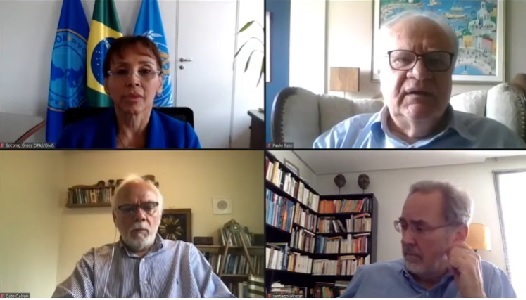CRIS/Fiocruz seminar discusses the COVID-19 pandemic in the WHO and PAHO agendas
04/10/2021
Cristina Azevedo (Fiocruz News Agency)
The COVID-19 pandemic was one of the main subjects discussed at two meetings that drew the attention of the entire world and of the region last week. While chiefs of state and of government debated the effects of the disease at the 76th General Assembly of the United Nations, at the 59th Board of Directors and 73rd Session of the Regional Committee of the World Health Organization (WHO) for the Americas, organized by the Pan-American Health Organization (PAHO), ministries of health discussed how to obtain a more equitable distribution of vaccines. With several issues in common, the agendas of these two meetings were the subject of the seminar Politics, health and pandemics: WHO and PAHO agendas, organized by the Fiocruz Global Health Center (CRIS/Fiocruz) last Thursday (September 29th). The event emphasized the need to correct current problems and prepare for future threats.
Invited to participate in the seminar, Socorro Gross, PAHO’s representative in Brazil, highlighted that in this moment of the pandemic the Board of Directors meeting made it clear that health is a fundamental element for sustainable development in the region. She emphasized some of the 13 resolutions adopted to strengthen public health policies in the Americas. For the first time, there was a discussion on how to increase the capacity of local research, development, and production to improve access to vaccines and drugs, in face of a “market that showed no solidarity”; the meeting also discussed the need to revitalize immunizers as a public good and to strengthen communication strategies to increase trust in vaccines, especially in this era of fake news.
Fiocruz and mRNA vaccines
One of the highlights of the PAHO meeting was the choice of two centers for vaccine production based on messenger RNA, one in Argentina and one in Brazil - in the latter case, Fiocruz. The choice, according to Socorro Gross, was motivated by the Foundation’s capacity, demonstrated over the past 40 years, to produce and develop vaccines. “We have seen its capacity to grow and to develop health products”, she observed. The meeting also emphasized the need to see health as a unique issue that includes human, environmental, and animal health.
In his comments, Cris senior researcher and assessor Luiz Augusto Galvão highlighted how interest in the subject of vaccines is making a comeback 30 years later, as well as the return of the United States to global discussions after Joe Biden became president early this year. “In order for a team to win, all stars must play. And this star had been missing”, observed Galvão.
F- in Ethics
To introduce the subject of the UN General Assembly, CRIS coordinator, Paulo Buss, played an opening video with the UN Secretary General, in which António Guterres told the world to wake up, as we are “on the brink of a precipice”, facing “a cascade of crisis”. Guterres emphasized that although science developed the COVID-19 vaccine very rapidly, political willingness was lacking, while suspicion and selfishness were abundant. As a result, “most of the population in rich countries is vaccinated, while 90% of Africans are still waiting for their first shot. We passed Science with flying colors, but we got an F- in Ethics”, said Guterres.
Former Ministry of Defense and of External Relations of Ecuador, Maria Fernanda Espinosa, who presided the UN’s 73rd General Assembly years ago, mentioned that neither the UN nor its Security Council managed to join forces rapidly to provide a response to the COVID-19 crisis. The resources received were much less than what had been required and many states took action by themselves, closing their borders and hoarding vaccines. “It is necessary to redesign the multilateral system to respond to emergencies”, she stated in a video sent to the seminar.
Problems also lead to opportunities, says Maria Fernanda Espinosa, who proposed an increase in the UN’s operations budget and the creation of an emergency fund; a mechanism of coordination of the UN with multilateral financial institutions that can activate this fund; and a reform or strengthening of the WHO, with resources to respond or prevent future epidemics. “The WHO should be the world’s authority for public health response, coordinating and leading operations, as well as for climactic emergencies, refugee crisis, and other emergencies that are not in the scope of the Security Council”, she defended.
Hope vs. optimism
Commenting on the subject, CRIS senior researcher and assessor, diplomat Santiago Alcázar, made a critical analysis of the General Assembly, mentioning the 2030 Agenda as a first step towards a solution and as equity in vaccination. He stated that several recent world forums had modest results, with political wishes not turning into transformative actions. “Guterres has hope, which is why he presented a shared agenda”, he said. Alcázar highlighted that in order to overcome the gaps mentioned by the Secretary-General in matters such as peace, climate, social, gender, digital and generational inequalities, it is necessary to build bridges. “We must strengthen global governance, focus on the future, make a new social contract, and renew the UN”, he said. “He proposes a Summit for the Future, but wasn’t this the idea in 2015 [when the millennium goals were approved]?”
“Guterres said he is hopeful, but hope and optimism are two different things. Hope clings to a promise, almost with a religious character. Seventy-five years after we got rid of a world war, the world is still a place of conflicts. The logical conclusion is that there is no hope. What is left to us is being optimistic”, concluded Alcázar.
Another edition of the Advanced Seminars in Global Health and Health Diplomacy will take place on October 13, with the subject of food security and the pandemic.


